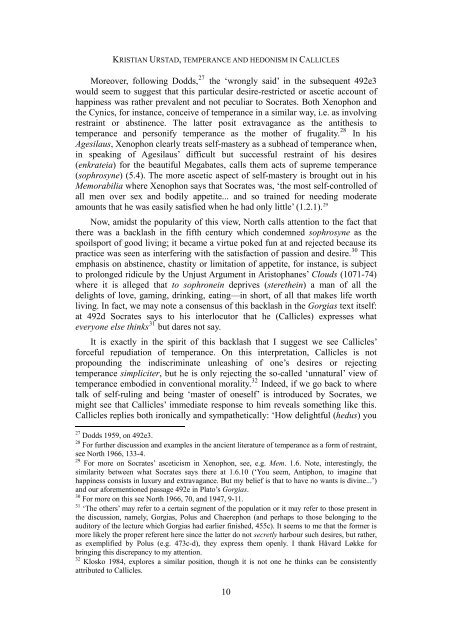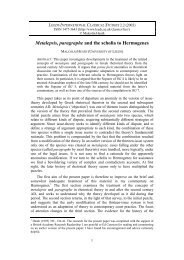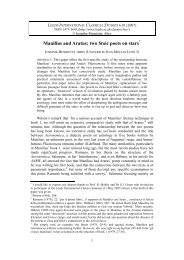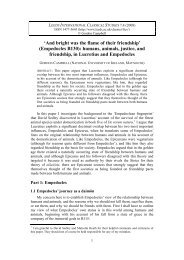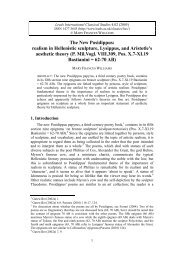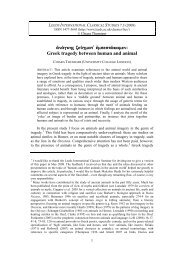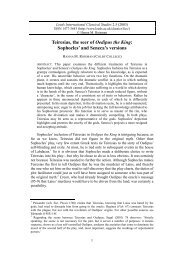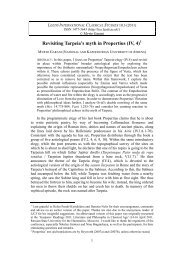The question of temperance and hedonism in Callicles - Leeds ...
The question of temperance and hedonism in Callicles - Leeds ...
The question of temperance and hedonism in Callicles - Leeds ...
Create successful ePaper yourself
Turn your PDF publications into a flip-book with our unique Google optimized e-Paper software.
KRISTIAN URSTAD, TEMPERANCE AND HEDONISM IN CALLICLES<br />
Moreover, follow<strong>in</strong>g Dodds, 27 the ‘wrongly said’ <strong>in</strong> the subsequent 492e3<br />
would seem to suggest that this particular desire-restricted or ascetic account <strong>of</strong><br />
happ<strong>in</strong>ess was rather prevalent <strong>and</strong> not peculiar to Socrates. Both Xenophon <strong>and</strong><br />
the Cynics, for <strong>in</strong>stance, conceive <strong>of</strong> <strong>temperance</strong> <strong>in</strong> a similar way, i.e. as <strong>in</strong>volv<strong>in</strong>g<br />
restra<strong>in</strong>t or abst<strong>in</strong>ence. <strong>The</strong> latter posit extravagance as the antithesis to<br />
<strong>temperance</strong> <strong>and</strong> personify <strong>temperance</strong> as the mother <strong>of</strong> frugality. 28 In his<br />
Agesilaus, Xenophon clearly treats self-mastery as a subhead <strong>of</strong> <strong>temperance</strong> when,<br />
<strong>in</strong> speak<strong>in</strong>g <strong>of</strong> Agesilaus’ difficult but successful restra<strong>in</strong>t <strong>of</strong> his desires<br />
(enkrateia) for the beautiful Megabates, calls them acts <strong>of</strong> supreme <strong>temperance</strong><br />
(sophrosyne) (5.4). <strong>The</strong> more ascetic aspect <strong>of</strong> self-mastery is brought out <strong>in</strong> his<br />
Memorabilia where Xenophon says that Socrates was, ‘the most self-controlled <strong>of</strong><br />
all men over sex <strong>and</strong> bodily appetite... <strong>and</strong> so tra<strong>in</strong>ed for need<strong>in</strong>g moderate<br />
amounts that he was easily satisfied when he had only little’ (1.2.1). 29<br />
Now, amidst the popularity <strong>of</strong> this view, North calls attention to the fact that<br />
there was a backlash <strong>in</strong> the fifth century which condemned sophrosyne as the<br />
spoilsport <strong>of</strong> good liv<strong>in</strong>g; it became a virtue poked fun at <strong>and</strong> rejected because its<br />
practice was seen as <strong>in</strong>terfer<strong>in</strong>g with the satisfaction <strong>of</strong> passion <strong>and</strong> desire. 30 This<br />
emphasis on abst<strong>in</strong>ence, chastity or limitation <strong>of</strong> appetite, for <strong>in</strong>stance, is subject<br />
to prolonged ridicule by the Unjust Argument <strong>in</strong> Aristophanes’ Clouds (1071-74)<br />
where it is alleged that to sophrone<strong>in</strong> deprives (sterethe<strong>in</strong>) a man <strong>of</strong> all the<br />
delights <strong>of</strong> love, gam<strong>in</strong>g, dr<strong>in</strong>k<strong>in</strong>g, eat<strong>in</strong>g—<strong>in</strong> short, <strong>of</strong> all that makes life worth<br />
liv<strong>in</strong>g. In fact, we may note a consensus <strong>of</strong> this backlash <strong>in</strong> the Gorgias text itself:<br />
at 492d Socrates says to his <strong>in</strong>terlocutor that he (<strong>Callicles</strong>) expresses what<br />
everyone else th<strong>in</strong>ks 31 but dares not say.<br />
It is exactly <strong>in</strong> the spirit <strong>of</strong> this backlash that I suggest we see <strong>Callicles</strong>’<br />
forceful repudiation <strong>of</strong> <strong>temperance</strong>. On this <strong>in</strong>terpretation, <strong>Callicles</strong> is not<br />
propound<strong>in</strong>g the <strong>in</strong>discrim<strong>in</strong>ate unleash<strong>in</strong>g <strong>of</strong> one’s desires or reject<strong>in</strong>g<br />
<strong>temperance</strong> simpliciter, but he is only reject<strong>in</strong>g the so-called ‘unnatural’ view <strong>of</strong><br />
<strong>temperance</strong> embodied <strong>in</strong> conventional morality. 32 Indeed, if we go back to where<br />
talk <strong>of</strong> self-rul<strong>in</strong>g <strong>and</strong> be<strong>in</strong>g ‘master <strong>of</strong> oneself’ is <strong>in</strong>troduced by Socrates, we<br />
might see that <strong>Callicles</strong>’ immediate response to him reveals someth<strong>in</strong>g like this.<br />
<strong>Callicles</strong> replies both ironically <strong>and</strong> sympathetically: ‘How delightful (hedus) you<br />
27<br />
Dodds 1959, on 492e3.<br />
28<br />
For further discussion <strong>and</strong> examples <strong>in</strong> the ancient literature <strong>of</strong> <strong>temperance</strong> as a form <strong>of</strong> restra<strong>in</strong>t,<br />
see North 1966, 133-4.<br />
29<br />
For more on Socrates’ asceticism <strong>in</strong> Xenophon, see, e.g. Mem. 1.6. Note, <strong>in</strong>terest<strong>in</strong>gly, the<br />
similarity between what Socrates says there at 1.6.10 (‘You seem, Antiphon, to imag<strong>in</strong>e that<br />
happ<strong>in</strong>ess consists <strong>in</strong> luxury <strong>and</strong> extravagance. But my belief is that to have no wants is div<strong>in</strong>e...’)<br />
<strong>and</strong> our aforementioned passage 492e <strong>in</strong> Plato’s Gorgias.<br />
30<br />
For more on this see North 1966, 70, <strong>and</strong> 1947, 9-11.<br />
31<br />
‘<strong>The</strong> others’ may refer to a certa<strong>in</strong> segment <strong>of</strong> the population or it may refer to those present <strong>in</strong><br />
the discussion, namely, Gorgias, Polus <strong>and</strong> Chaerephon (<strong>and</strong> perhaps to those belong<strong>in</strong>g to the<br />
auditory <strong>of</strong> the lecture which Gorgias had earlier f<strong>in</strong>ished, 455c). It seems to me that the former is<br />
more likely the proper referent here s<strong>in</strong>ce the latter do not secretly harbour such desires, but rather,<br />
as exemplified by Polus (e.g. 473c-d), they express them openly. I thank Håvard Løkke for<br />
br<strong>in</strong>g<strong>in</strong>g this discrepancy to my attention.<br />
32<br />
Klosko 1984, explores a similar position, though it is not one he th<strong>in</strong>ks can be consistently<br />
attributed to <strong>Callicles</strong>.<br />
10


